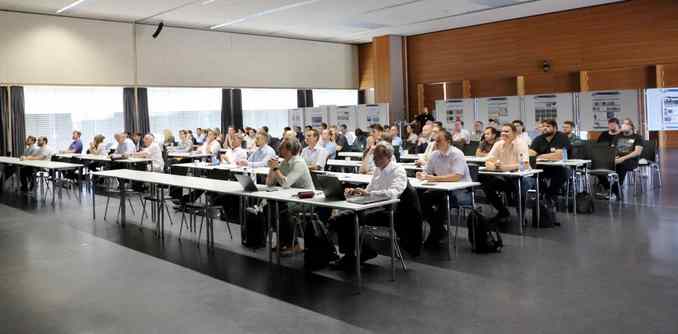International Conference on Digitization in Microscopy Fourth Aalen Materials Microscopy Day at Aalen University was dedicated to the exchange between research and industry

Rund 90 Fachleute aus Industrie und Forschung tauschten sich beim 4. Aalener Materialmikroskopietag in der Aula der Hochschule Aalen bei Fachvorträgen, Diskussionsrunden und Führungen über die neuesten Entwicklungen in der digitalen Mikroskopie aus. (Foto: Julian Schurr)
Digitization is omnipresent. Today, it already influences almost all areas of human life. Digitization also offers microscopy immense potential, which was addressed by around 90 experts from industry and research at the 4th Aalen Materials Microscopy Day in the auditorium of Aalen University. The conference was hosted by the Materials Research Institute (IMFAA) at Aalen University. In expert lectures, discussion panels and during guided tours, participants exchanged views on the latest findings and methods in digital microscopy with a special focus on electromobility, renewable energies and microelectronics.
Artificial intelligence (AI) that independently evaluates images from high-resolution scanning electron microscopes, finding tiny defects in components, recognizing potential for improvement in materials for energy technology and sustainable mobility, and learning more and more: what sounds like science fiction has long been the order of the day in microscopy and materials research as well as in daily use in industry.
There is a close interaction between the gain in knowledge in materials research, the development of ever smarter materials and products, and the increased use of machine learning methods to evaluate the data generated in the process: "In this one-day symposium, we wanted to show what digitalization can do for the fields of renewable energies, electrification and autonomous systems on the way to the society of the future," summarizes Prof. Dr. Gerhard Schneider from the management team of the Aalen hosts.
The range of topics covered by the renowned speakers from Europe and overseas highlighted the many possible applications of AI in microscopy: Prof. Dr. Rich Johnston from Swansea University in the UK, for example, gave an insight into his team's research work in his talk entitled "Multimodal 3D Characterization of Carbon-based Perovskite Solar Cells," before Prof. Dr. Gerhard Schneider and Dr. Timo Bernthaler, from the Materials Research Institute (IMFAA) at Aalen University, addressed the opportunities that machine learning offers to materials research from different perspectives.
Dr. Peter Czurratis, managing director of PVA TePla Analytical Systems GmbH in Westhausen, showed how algorithms are used in defect analysis for semiconductors: "Artificial intelligence evaluates the images from high-resolution, acoustic microscopes in this non-destructive testing method," he explained. Dr. Matt Andrew of Carl Zeiss Microscopy from ZEISS Innovation Center California in the U.S. explained how barriers to speed and resolution in 3D tomography image reconstruction can be overcome thanks to AI and deep-learning methods.
For smarter devices and smarter mobility
Matias Volman Stern from Matworks GmbH in Aalen, Germany, also provided exciting impetus for the conference motto, reporting on the FA 4.0 research project, among other things: "In collaboration with four other European countries, we are researching the use of intelligent, AI-based tools to ensure reliable electronic devices for smart mobility and industrial production," he summarized. Further interesting insights into their research work were provided by the PhD students of the IMFAA Machine Learning team: Amit Kumar Choudhary, Andreas Jansche and Patrick Krawczyk. Finally, Andreas Kopp and Tim Schubert, also researchers at IMFAA, gave a tour of the research building at Aalen University. They presented research in the fields of batteries, magnets, additive manufacturing, materialography and laser material processing directly on site in the laboratories as well as at the four-axis test stand.
"Presentations at a very high level" and "excellent organization" were among the feedback from participants at the end of the conference.
